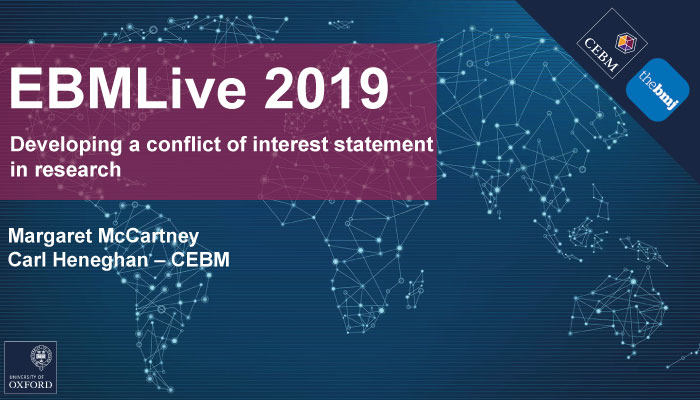





This Institute of Medicine (IOM) report examines conflicts of interest in medical research, education, and practice and in the development of clinical practice guidelines. Setting out that the ‘central goal of conflict of interest policies in medicine is to protect the integrity of professional judgment and to preserve public trust rather than to try to remediate bias or mistrust after it occurs.’ And ‘if medical institutions do not act voluntarily to strengthen their conflict of interest policies and procedures, the pressure for external regulation is likely to increase.’
The time has, therefore, come to strengthen conflict of interests by developing a statement that clarifies what should be declared in what contexts; what should be permissible in research, what shouldn’t be; in education what should be the norm, and in practice how should the public be made aware of interests that can distort decision making.
A recent BMJ editorial: ‘Commercial interests, transparency, and independence: a call for submissions’ set out the need To explore when commercial ties are truly necessary and when independence is most needed
In this workshop, we plan to
Three things to do now:
[1] Commercial interests, transparency, and independence: a call for submissions BMJ 2019; 365: l1706
[2] Conflict of Interest in Medical Research, Education, and Practice.
Institute of Medicine (US) Committee on Conflict of Interest in Medical Research, Education, and Practice; Lo B, Field MJ, editors. Washington (DC): National Academies Press (US); 2009.
Competing interests:
Carl Heneghan has received expenses and fees for his media work (including payments from BBC Radio 4 Inside Health). He has received expenses from the WHO, FDA, and holds grant funding from the NIHR, the NIHR School of Primary Care Research, The NIHR BRC Oxford and the WHO. He has received financial remuneration from an asbestos case and given free legal advice on mesh cases. On occasion, he receives expenses for teaching EBM and is also paid for his GP work in NHS out of hours. He is Director of CEBM, which jointly runs the EvidenceLive Conference with the BMJ and the Overdiagnosis Conference with international partners, based on a non-profit making model. He is Editor in Chief of BMJ EBM and an NIHR Senior Investigator.
Margaret McCartney is a GP partner and senior Fellow for Evidence and Values at the RCGP. She is an author, freelance writer and broadcaster for the lay and medical press and the BBC. She is an honorary Fellow at the CEBM. She gives a small amount of money regularly to Keep Our NHS Public. She has had travel and occasionally locum expenses paid to give talks to healthcare professionals and the public but has never been hosted by a technology/pharmaceutical/PR company. Her DOI is at whopaysthisdoctor.org.uk